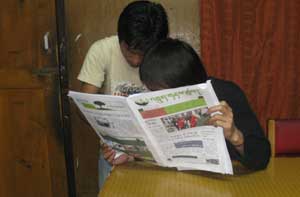Bhutan media goes vocal
TANDING UP to the Government’s indirect tactics to control them, the private media in Bhutan continues to report on national political corruption and nepotism.
A confidential letter from Ministry of Information and Communication, directing all departments under the Ministry to stop providing advertisement to The Bhutanese bi-weekly newspaper, was recently leaked.
Signed by a staff member, the letter states Minister Nandalal Rai, a retired military personnel, had ordered the letter to be circulated.
Following the revelation, private media in the country have questioned the Government’s commitment to help grow the budding media industry.
They have also expressed concerns over the sustainability of freedom of expression that is necessary for vibrant democracy in Bhutan.

Business Bhutan weekly quoted Rai saying that the circulation of the letter was result of a communication lapse between him and his subordinate who drafted the circular.
Rai stated another circular had been sent to amend the errors. However, he was unable to provide reporters with proof.
Private media in Bhutan evolved only in 2006.
Today, only a handful of independent media organisations are critical of the Government’s alleged involvement with top political leaders, including Prime Minister Jigmi Thinley, on several irregularities.
Thinley is alleged to have the upper hand in two major land scam cases, favouring his relatives while providing financial compensation when acquiring land and allowing the Bhutan Lottery to continue despite accusations of embezzlement.
The Government closed down the lottery after media reports surfaced, revealing that Indian lottery mafias had earned millions through it
The Government has since move to silence the private media by cutting down its main source of income – advertising.
In a circular issued in June, the Finance Ministry asked all government agencies to reduce advertisement expenditures.
According to the International Federation of Journalists (IFJ), 80 per cent of revenue for media in Bhutan is through public advertisements.
IFJ further said, the government’s move to forbid placing advertisments in The Bhutanese is believed to be in retaliation for the publication of articles highlighting possible cases of corruption and abuse of power which have arisen from the government’s use of its discretionary powers.
Early this week, the Election Commission of Bhutan released a notice stating all election related advertisements could only be published in state-owned media.
The Government cited a total expenditure on public advertisement of Nu 300 million ($5.7 million) in 2010 to reduce expenses on advertisement.
However, The Bhutanese reported that the Government spent only Nu 58 million ($1.1 million) in 2010-11.
Until a few years ago, all of the country’s media content was censored, with the Government determining what could and couldn’t be published or broadcast.
Even during the first few years of operation, independent media maintained self-censorship when reporting stories on government and political leaders.
The dynamics have substantially changed since the entry of Business Bhutan and The Bhutanese into the nation’s media industry.
After receiving a number of verbal threats from political leaders, the Government has now made the move to stop advertising revenues from flowing into those media companies.
The media companies are starting to feel the effects of the government’s effort.
In a recent meeting between the private media owners, they discussed the possibilities of mergers or shutting down the business.
Amidst uncertainty, independent media organisations continue to report on the government’s misconduct, irregularities and negative behaviour, enforcing political transparency and accountability.
First published in Our World Today